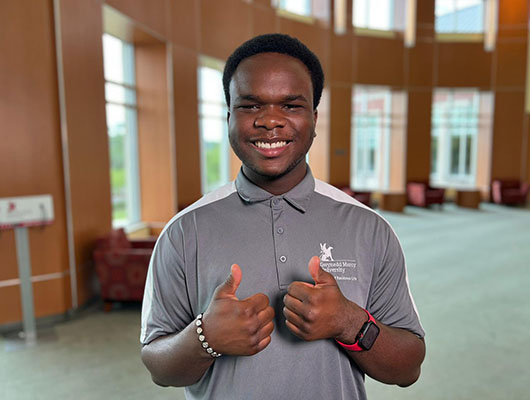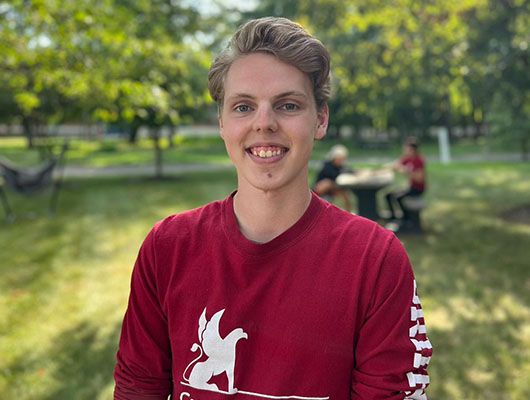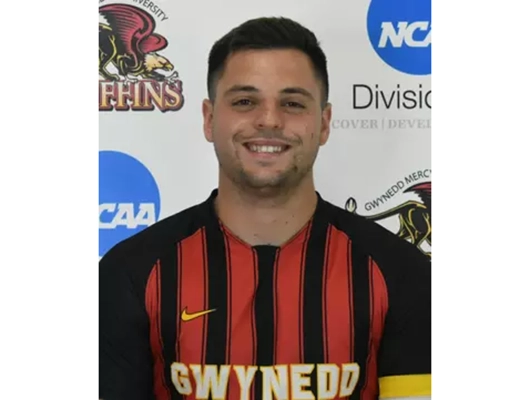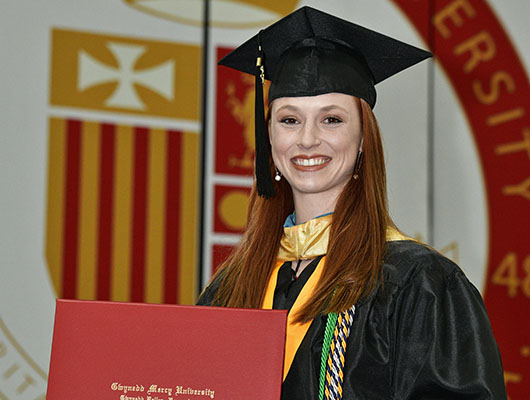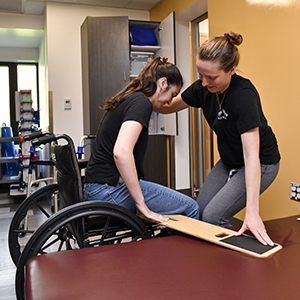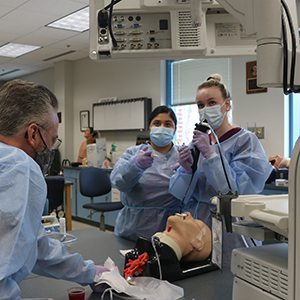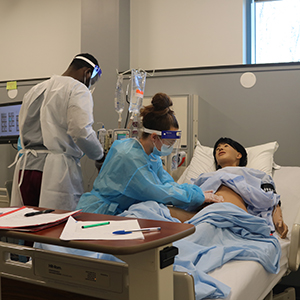Occupational Science Degree (BHS) - Pre-OT Program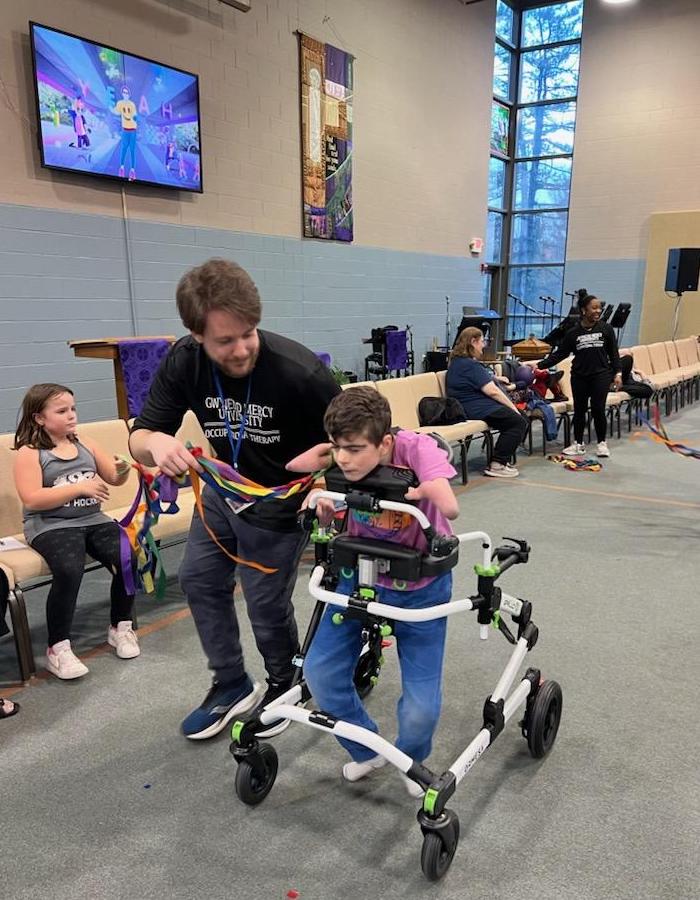
Become an Occupational Therapist
The Occupational Science program can serve as a fast-track dual degree program for qualified GMercyU students to earn both a Bachelor of Health Science (BHS) in Occupational Science and a Master of Science (MS) in Occupational Therapy without having to apply to graduate school or take a graduate school entrance exam — and saving you more than $40,000 of graduate school tuition.
The BHS in Occupational Science and MS in Occupational Therapy can be completed in about 5 years, saving you an entire year of time.
As just one of 14 institutions in the U.S. with an occupational science major or minor, there is no better place to begin your OT journey than GMercyU.
Program Summary
| 124 undergraduate credits for BHS in Occupational Science (with 38 additional credits for MS in Occupational Therapy) |
| 3 years of pre-professional liberal arts education + 1 year of professional Occupational Therapy education (complete your MSOT degree during year 5) |
Mission
The Mission of the Occupational Science Program at GMercyU is to offer an education centered on the acquisition of knowledge about human occupation. As the study of humans as occupational beings, Occupational Science investigates the complexity of doing, being, belonging, and becoming in relation to health, well-being, and occupational justice. Occupational Science students will be prepared to connect foundational knowledge of occupation in order to apply, analyze, evaluate, and creatively use occupation within the context of occupational therapy education and practice.
Accreditation

The entry-level occupational therapy master’s degree program is accredited by the Accreditation Council for Occupational Therapy Education (ACOTE) of the American Occupational Therapy Association (AOTA), located at 7501 Wisconsin Avenue, Suite 510E, Bethesda, MD 20814. ACOTE’s telephone number c/o AOTA is (301) 652-AOTA and its web address is www.acoteonline.org. Graduates of the program will be eligible to sit for the national certification examination for the occupational therapist administered by the National Board for Certification in Occupational Therapy (NBCOT). After successful completion of this exam, the individual will be an Occupational Therapist, Registered (OTR). In addition, all states require licensure in order to practice; however, state licenses are usually based on the results of the NBCOT Certification Examination. Note that a felony conviction may affect a graduate’s ability to sit for the NBCOT certification examination or attain state licensure.
About the Program
Hear from OT students and professors about the field and our dual degree.
-
-
$100,040
median annual salary in 2024 for occupational therapists in the Philadelphia area (Bureau of Labor Statistics*)
-
#8
ranking in U.S. News & World Report's 2025 "Best 100 Healthcare Jobs"
-
11%
projected job growth through 2033, nearly three times the national average
(Bureau of Labor Statistics)
-
Occupational Science is a science that focuses on the activities or “occupations” of everyday living. This growing field of study takes a holistic approach to better understanding the meaning, function, and abilities of healthy and disabled individuals to participate in and perform daily activities and live a satisfying life.
Courses in liberal arts with a strong foundation in the behavioral sciences, particularly psychology, coupled with courses in occupational science will expand your ability to understand how people develop, recover, manage and improve essential skills for daily living.
Courses in occupational science will expand your ability to understand the complexity of things people need to, want to and are expected to do. This type of knowledge is foundational to understanding our clients in occupational therapy as occupational beings.
Did you know that the World Federation of Occupational Therapists (WFOT) has strong support for occupational science and its value to society and to occupational therapy? The program learning outcomes of Gwynedd Mercy University’s Occupational Science Program are directly connected to WFOT’s statement of occupational science's significance of position to society.
Occupational therapists focus on improving a person’s ability to complete everyday tasks and activities (occupations) – from childhood to older adulthood.
As an occupational therapist, you might:
- Enable young children with a developmental delay to improve their ability to play or participate in school and other social activities
- Assist an adult with an orthopedic injury to regain use of his or her hand and arm, allowing him or her to perform daily activities more independently
- Help older adults who have suffered a stroke or traumatic brain injury perform self-care and household activities so they can return home safely from the hospital or skilled nursing facility
- Provide strategies to adolescents with severe mental illness to aid them in finding and securing employment in order to live on their own
A developmental delay or other types of disability can alter one’s ability to perform meaningful daily activities. A registered occupational therapist helps people to cope and manage their daily activities, as well as adapt to environments in a way that best supports their safety and independence.
Program Details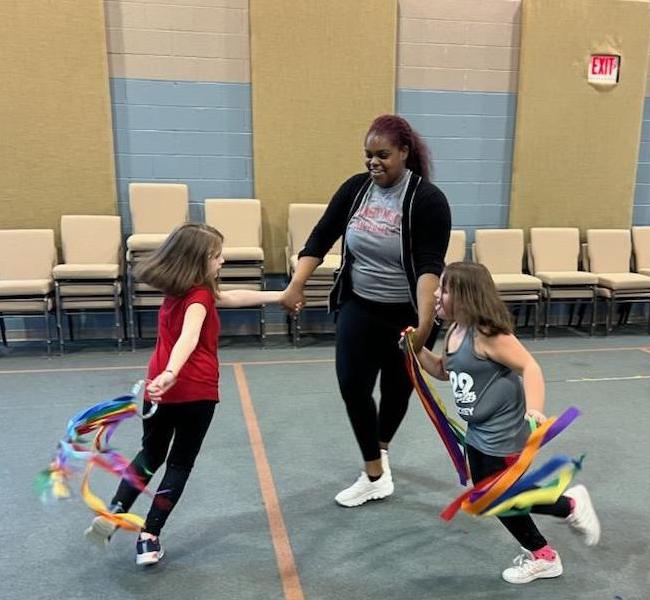
Don’t let the name fool you. GMercyU’s BHS in Occupational Science is less focused on mastering the physical sciences, such as biology, chemistry and physics, and more focused on the science of everyday activities that people do as individuals, in families and with communities to occupy time and bring meaning and purpose to life.
As an Occupational Science student, the bulk of your major courses will focus on the liberal arts, including human development, psychology, and occupational science. These courses will help you develop the knowledge needed to better understand the challenges faced by those with disabilities. In doing so, Occupational Science students are uniquely prepared to enter into our Occupational Therapy Program.
If you are interested in Occupational Therapy or have applied to the OT program, please reach out to Kathy Hosack by email at Hosack.K@gmercyu.edu or calling (215) 646-7300 ext. 21699.
The four-year Occupational Science major includes three years of pre-professional studies with a focus on liberal arts, occupational science, health science, and general education. The fourth year begins the professional phase of the Occupational Therapy Program, at an undergraduate tuition rate.
The Occupational Science (OSC) courses offered in this dual degree program are listed below:
Year 1: Fall
OSC 100: Introduction to Occupation and Occupational Science (3 credits)
Year 2: Spring
OSC 201: Nature and Meaning of Human Occupation (3 credits)
Year 3: Spring
OSC 301: Occupational Perspective of Health (3 credits)
OSC 302: Neuroscience of Occupational Behavior (3 credits)
Year 4: Summer
OSC 402: Neuroscience for Occupational Therapy (2 credits)
OSC 410: Ethical Foundations in Occupational Therapy (2 credits)
Year 4: Fall
OSC 404: Therapeutic Use of Self (2 credits)
OSC 405: Foundations of Occupational Therapy (3 credits)
OSC 406: Creativity and Activity Analysis (2 credits)
OSC 414: Research Methods I: Evidence-based Practice (3 credits)
OSC 419: Functional Anatomy and Kinesiology for Occupational Therapy (5 credits)
Year 4: Spring
OSC 411: Health and Occupational Participation of Children and Youth (3 credits)
OSC 412: Occupational Therapy Process: Children and Youth (5 credits)
OSC 413: Occupational Therapy Fieldwork I: Children and Youth (1 credit)
OSC 416: Health Care, Policy, and Advocacy (2 credits)
OSC 421: Occupational Therapy & Upper Extremity Rehabilitation (3 credits)
OSC 4000: Research Methods II: Applied Research (3 credits)
Please note: All professional phase Occupational Therapy students (senior year and beyond) may be required to obtain the following annually – background check, physical, current CPR certification, PPD testing, health insurance. Students will be required to have a laptop, have transportation to and from fieldwork, and expected to hold student memberships to the American Occupational Therapy Association and Pennsylvania Occupational Therapy Association.
Additional Occupational Therapy course listings can be found on the MSOT degree page.
OSC 402: Neuroscience for Occupational Therapy (2 credits)
This course will provide students with a deep understanding of the intricate relationship between the nervous system and occupational performance. This course explores the fundamental principles of neuroscience, including the neuroanatomical and neurophysiological bases of sensory perception, emotion, cognition, learning, and movement, and how these concepts relate to occupational therapy practice.
OSC 404: Therapeutic Use of Self (2 credits)
Exploration of human behavioral theories and practice of therapeutic use of self within individual and group therapeutic contexts. Focus on understanding the occupational needs of individuals and groups, teaching-learning process, appraisal of effective communication, empathy, mindfulness, and building of rapport to foster effective therapeutic relationships.
OSC 405: Foundations of Occupational Therapy (3 credits)
Introduction to the foundations of the occupational therapy profession including its history, philosophical base, professional terminology, theory development, frames of reference, and the varied scope and roles of the occupational therapy practitioner.
OSC 406: Creativity and Activity Analysis (2 credits)
Exploration of the historical and contemporary use of creativity in the promotion of health through client-centered activities to promote health and recovery. Emphasis on the analysis, grading, and managing the complexity of therapeutic activities. Includes a practice lab.
OSC-410 Ethical Foundations in Occupational Therapy (2 credits)
This course explores the fundamental values and standards that guide ethical decision-making in the context of occupational therapy practice.
OSC 411: Health and Occupational Participation of Children and Youth (3 credits)
Examines the development, occupational behavior, and prevailing health needs of children and adolescents with or at risk for disabilities and occupational injustice. Focus on understanding children and youth as occupational beings with varied health conditions that can impact occupational performance and participation.
OSC 412: Occupational Therapy Process: Children and Youth (5 credits)
Integrates theories and the occupational therapy process of evaluation (including assessment), intervention, and targeted outcomes with children and adolescents. Includes a practice lab.
OSC 413: Occupational Therapy Fieldwork I: Children and Youth (1 credit)
Immersion experience into a therapeutic service delivery context with children or youth.
OSC 414: Research Methods I: Evidence-based Practice (3 credits)
Review of quantitative and qualitative research methodologies, appraisal of professional literature and levels of evidence, and the influence of clinical expertise and client values in supporting best therapeutic practices.
OSC 416: Health Care, Policy, and Advocacy (3 credits)
A focus on understanding health care, policy, and reimbursement that influence access to occupational therapy practice across multiple practice areas. Review of intra-professional and inter-professional roles, and the laws and regulations that influence occupational therapy practice. Promotion of occupational therapy to other professionals, service providers, consumers, third-party payers, regulatory bodies, and to the public.
OSC 419: Functional Anatomy and Kinesiology for Occupational Therapy (5 credits)
Focus on the study of the body functions and structures of the human body with a major emphasis on functional anatomy within the domain of concern for occupational therapy and analyzing typical, atypical, and compensatory human movement across the life span.
OSC 421: Occupational Therapy and Upper Extremity Rehabilitation (3 credits)
This course focuses on the evaluation and treatment of upper extremity dysfunction from an occupational therapy perspective. This lecture/lab combination covers nerve and muscular/orthopedic issues throughout the upper extremity with an emphasis on the wrist and hand. Multiple orthotics are fabricated in the lab portion of this course.
OSC 4000: Research Methods II: Applied Research (3 credits)
This course is designed to equip students with the knowledge and skills needed to engage in effective research practices within the occupational therapy profession. This course emphasizes the practical application of research methodologies to address real-world challenges faced by occupational therapists.
Students are required to have a laptop with camera capabilities.
Occupational Science majors are required to complete 126 credits to earn a Bachelor of Health Science (BHS) in Occupational Science.
Students are eligible to re-take up to 2 courses in the Occupational Science curriculum that are not an OSC 400 level course. If a student earns less than a “C” in one or more 400 level courses, they cannot progress further in the Occupational Therapy Master’s Program their senior year until the course is retaken and earning a “B” or better in the course or courses. If a student earns less than a “C” in three or more 400 level courses, they will be disqualified from taking coursework to earn a Master of Science degree in Occupational Therapy. Disqualified students can change their major and complete program and bachelor degree requirements of a different major offered at Gwynedd Mercy University.
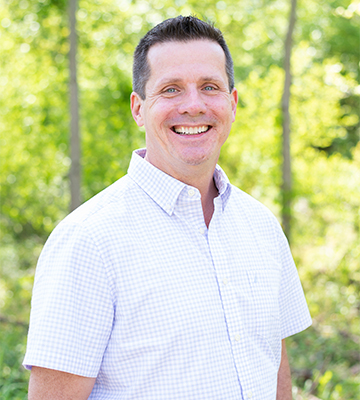 Thomas Mernar, PhD, OTR/L
Thomas Mernar, PhD, OTR/L
Position: Associate Professor and Program Director, Occupational Science and Occupational Therapy
Did You Know? Dr. Mernar founded the OS and OT programs at GMercyU. He has been a licensed occupational therapist (OTR) for more than 20 years, with experience working clinically in acute and sub-acute traumatic brain injury units, sub-acute skilled nursing, long-term care, and assisted living facilities.
Read bio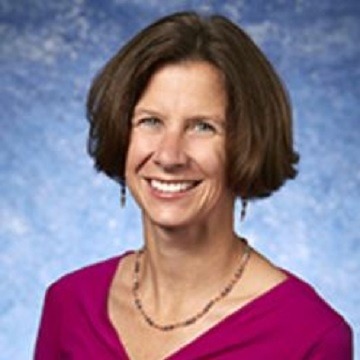 Mindy MacRone-Wojton, DSc, OTR/L
Mindy MacRone-Wojton, DSc, OTR/L
Position: Assistant Professor, Occupational Science and Occupational Therapy
Did You Know? Dr. Wojton has been a licensed Occupational Therapist (OTR®) for more than 20 years. She has spent most of her career as a school-based therapist, working with and advocating for students with attention deficit disorder, autism, cerebral palsy, emotional disturbance, genetic disorders, learning disabilities, and intellectual disabilities.
Read bio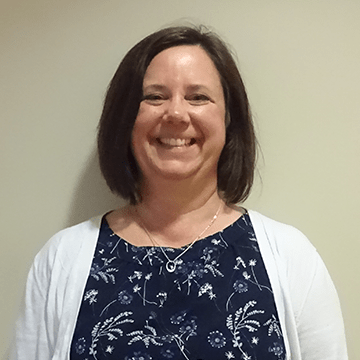 Sharon Montgomery, OTD, OTR/L, CHT, CEAS
Sharon Montgomery, OTD, OTR/L, CHT, CEAS
Position: Assistant Professor, Occupational Science and Occupational Therapy
Did You Know? Dr. Montgomery has been a registered and licensed Occupational Therapist (OTR®) for more than 30 years. She has spent her career working in a hospital setting providing both adult inpatient and outpatient rehabilitation, and she holds a specialty certification in Hand Therapy.
Read bio
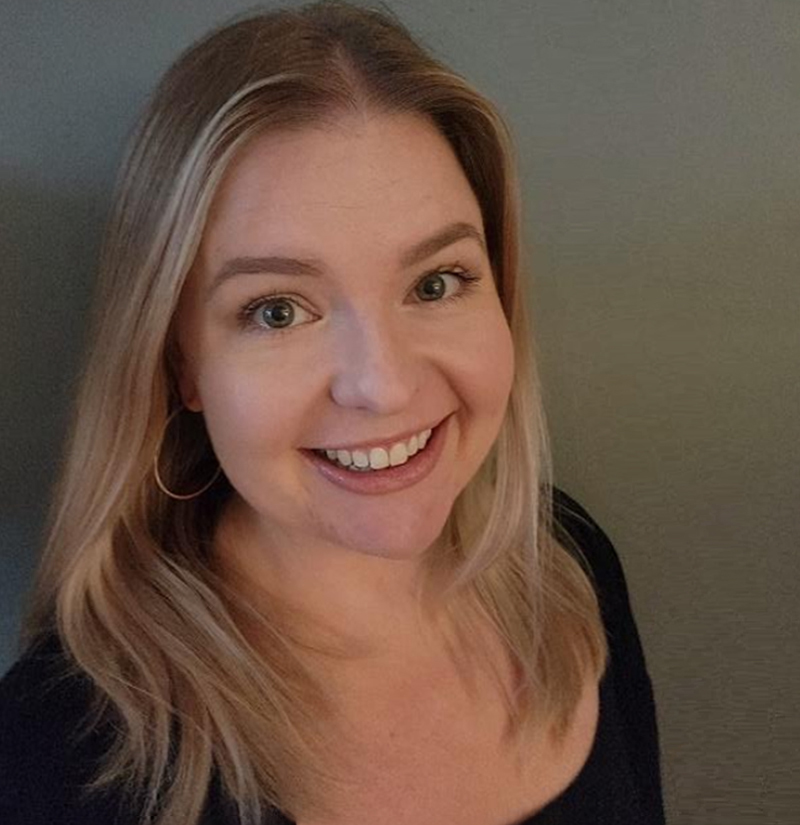 Megan R. Mueller, OTD, OTR/L, BCPR
Megan R. Mueller, OTD, OTR/L, BCPR
Position: Assistant Professor, Occupational Science and Occupational Therapy
Did You Know? A registered and licensed Occupational Therapist (OTR®) for more than 10 years, Mueller has worked in the acute inpatient rehabilitation setting with adults who sustained spinal cord injuries, cerebrovascular accidents, traumatic brain injuries, and numerous other
neurologic and orthopedic conditions.
Read bio
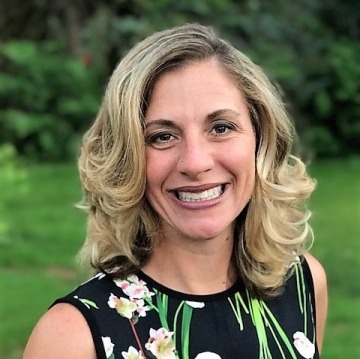 Michele Peterson, EdD, OTR/L
Michele Peterson, EdD, OTR/L
Position: Assistant Professor and Academic Fieldwork Coordinator, Occupational Therapy
Did You Know? Professor Peterson has been licensed Occupational Therapist (OTR®) for more than 20 years with experience working in pediatrics, specifically school-based, preschool age, birth to three, and pediatric in-patient and out-patient settings. She holds a specialty certification in the Sequential Oral Sensory Approach to feeding.
Read bio
Admission
There are three paths of entry into the dual degree program in Occupational Science and Occupational Therapy.
First, a select number of high school graduates will enter as freshmen. High school seniors must hold a minimum cumulative GPA of 3.1 (based on a 4.00 scale). CLEP or AP credits are accepted for courses in Anatomy and Physiology, General Psychology, Abnormal Psychology, Developmental Psychology, Sociology/Anthropology or Statistics. Due to the limited number of spaces available in the BHS in Occupational Science (Pre-OT) program, first-year students are strongly encouraged to submit a completed application no later than December 1. The Admissions team will review all completed applications for the Occupational Science program in December and begin issuing admissions decisions in January. Students who apply after the December 1 deadline will be considered for admission based on their qualifications and available spots.
Second, a select number of undergraduate students enrolled at GMercyU can apply to change their major to Occupational Science. To be eligible for a change of major to Occupational Science, GMercyU students must have completed 24 or more credits at GMercyU by the end of the spring semester, maintained a cumulative GPA of a 3.1 or greater, submit the internal student change of major application to Dr. Thomas Mernar, Program Director of Occupational Science and Occupational Therapy Programs at mernar.t@gmercyu.edu, and conduct an in-person interview with the Program Director. Having earned an overall GPA of 3.1 or greater does not guarantee acceptance of a change of major to Occupational Science. Your academic transcript will be reviewed in order to determine your change of major eligibility. If you meet the GPA requirements, the Program Director of the Occupational Science and Occupational Therapy Program will contact you for an interview.
Third, pending the current cohort size, a limited number of students from other academic institutions may be eligible to transfer directly into the Occupational Science major if they have completed an undergraduate Admissions application, completed 24 or more credits, maintained a cumulative GPA of 3.1 or greater, complete an external student transfer application that includes a written essay, and conduct an in-person interview with an Occupational Science and Occupational Therapy Program faculty member.
Occupational Science majors are guaranteed entry into the Professional Phase of the Occupational Science Program the summer after their junior year if the following criteria are met:
- Cumulative undergraduate GPA of 3.1 or greater.
- Prerequisite courses (General Psychology, Abnormal Psychology, Developmental Psychology, Sociology, Anatomy and Physiology I and II with lab, and Statistics) combined GPA of 3.1 or greater and earn a “C” or better in all of these prerequisite courses.
- Completed and documented 20 hours or more of occupational therapy observation beginning in the fall of their freshman year to the spring of their junior year or completion of alternative assignment by faculty advisor.
- Attest to being able to meet the technical standards for occupational therapy practice. Students entering into and engaged during the full course of the Occupational Therapy Master’s Program must possess essential skills (observation, communication, motor function, intellectual-conceptual abilities, integrative and quantitative abilities, and behavioral and social attributes) to perform all educational (classroom, laboratory and clinical), fieldwork, and experiential preceptorship tasks in an accurate, safe, and efficient manner, to the satisfaction of the faculty, with or without reasonable accommodation.
Observation
- Normal or corrected visual ability sufficient for client observation and assessment to ensure safety and accurate measurement.
- Ability to obtain information from written documents, videotaped data, graphic images and measuring devices accurately and within a reasonable time frame.
- Ability to sufficiently monitor and assess health needs of clients.
Communication
- Interact with others in a professional, courteous, and collaborative manner while using good judgment for confidentiality.
- Demonstrate respect for the dignity of each person.
- Maintain integrity in word and deed with others.
- Read, speak, and write in English effectively using proper grammar, spelling, and punctuation.
Motor Function
- Assume a variety of body postures that can include continuous sitting, standing, walking, bending, reaching, pulling, lifting, stooping, kneeling, and crawling.
- Demonstrate manipulation skills to effectively carry and use therapeutic equipment (i.e. assistive devices, weights).
- Demonstrate movement and mobility skills that are required for safe handling of persons of various sizes in order to perform safe transfers and guarding during functional mobility with and without an assistive device.
- Pushing and pulling in order to provide resistance for the purposes of maneuvering and transitioning persons such during bed mobility, using a wheelchair, and for sitting and standing balance activities.
- Demonstrate eye-hand coordination, postural control, strength, endurance, and integrated function of the senses (vision, hearing, smell, and touch) during the therapeutic process.
Intellectual-Conceptual Abilities
- Demonstrate verbal and written insight into one’s own academic and clinical performance.
- Demonstrate the mental capacity to understand, problem solve, and make judgments in order to promote ethical reasoning.
- Demonstrate ability to collect, document, and analyze evaluation data and implement client-centered and occupation-based interventions.
Integrative and Quantitative Abilities
- Demonstrate the mental capacity to understand, problem solve, and make judgments in order to promote safety.
- Intellectual capacities to measure, evaluate, calculate, reason, analyze and synthesize information specific to client care.
- Demonstrate ability to apply information learned from the classroom to a therapeutic practice environment.
Behavioral and Social Attributes
- Demonstrate mature and professional behaviors with other students, faculty, colleagues, and clients.
- Be receptive and open to mentor feedback about academic or fieldwork performance and adherence to academic and fieldwork policies and procedures.
- Establish and maintain a therapeutic relationship with clients.
- Ability to work cooperatively and collaboratively with others.
Students should review the Technical Standards for the MSOT program carefully and identify if additional supports are needed for any portion (didactic and clinical) of the MSOT program. Students are encouraged to contact the Student Accessibility Services Office to arrange an individualized consultation to discuss any support services or accommodations they may need.
Please note: Students enrolling in this program must have the ability to obtain a U.S. background check and other clearances for placement in a U.S. clinical/school setting. U.S. citizenship or permanent residency is also a requirement for licensure within certain academic programs. International students and students who are under DACA status or are undocumented should carefully review the licensure requirements in their state before enrolling in a degree program that leads to licensure. Additional information can be found on the National Conference of State Legislatures website.
Scholarships
GMercyU offers dozens of scholarships and grants to help you get a great education at an affordable cost. They do not need to be repaid and generally are renewable each year.
Transfer to the Program
GMercyU grants up to 90 qualifying credits toward a bachelor's degree and offers renewable transfer scholarships and grants ranging from $11,000 to $21,000 a year.
